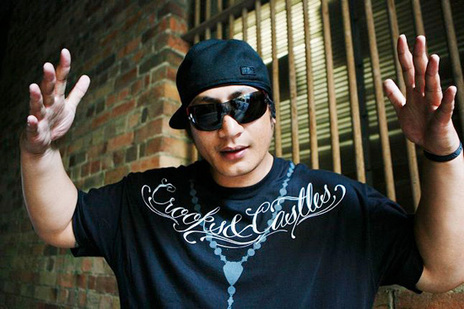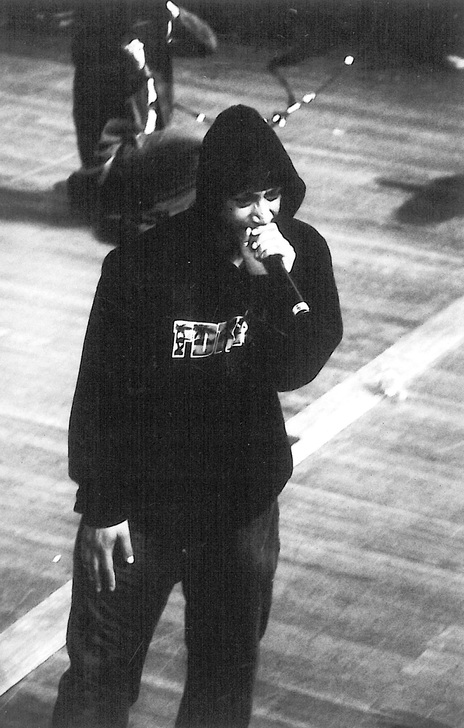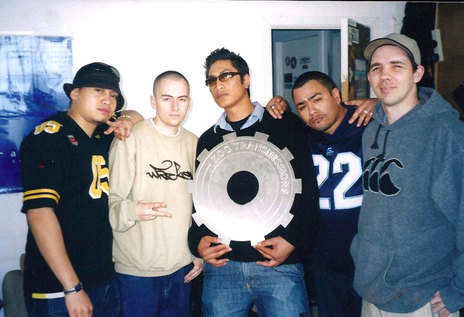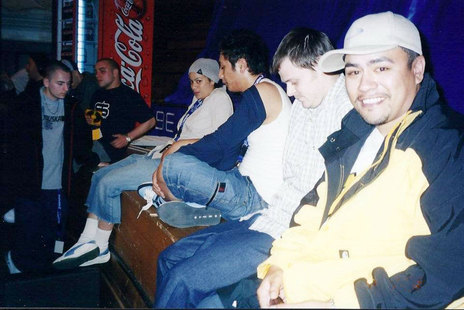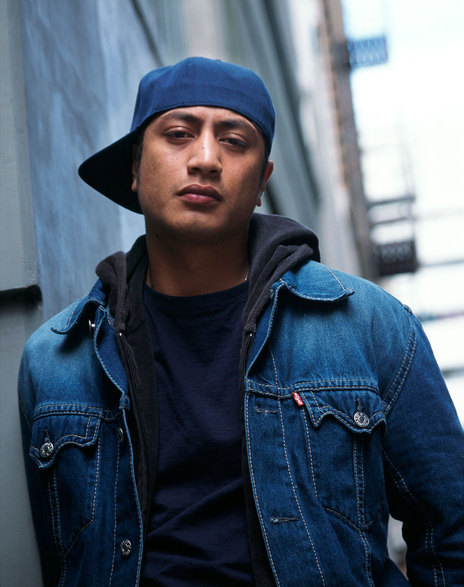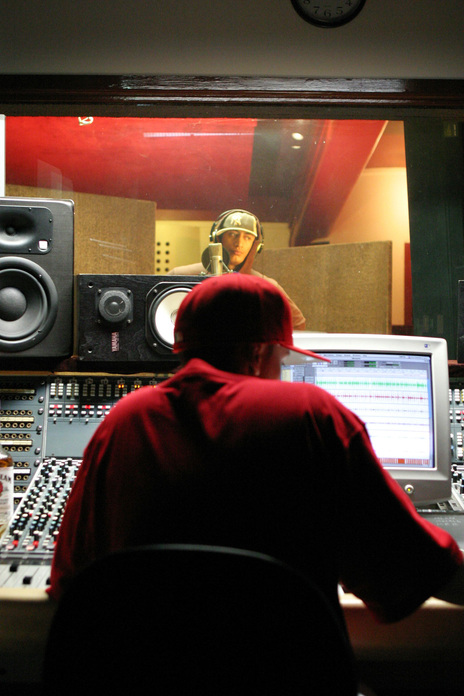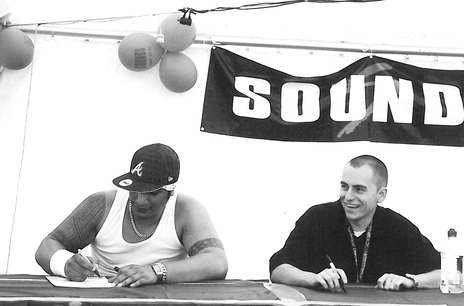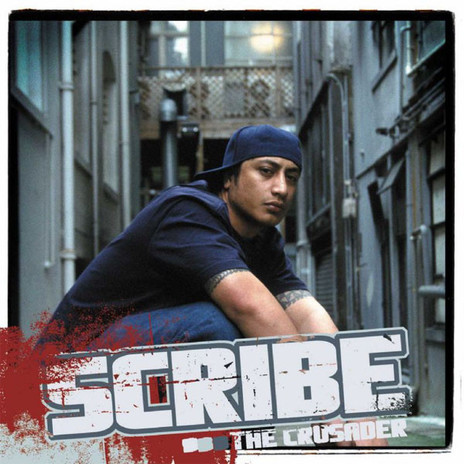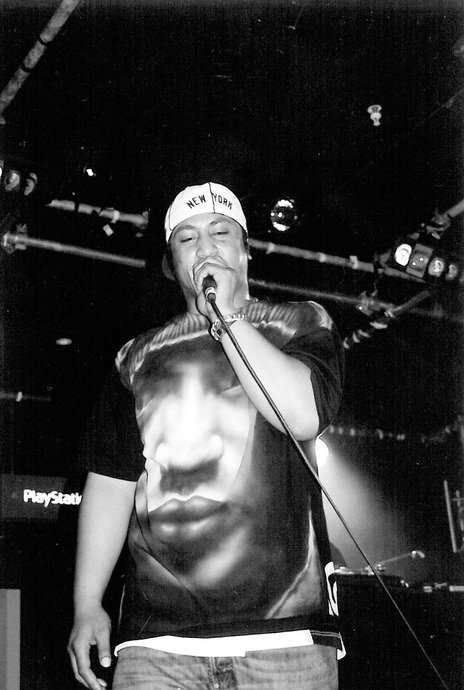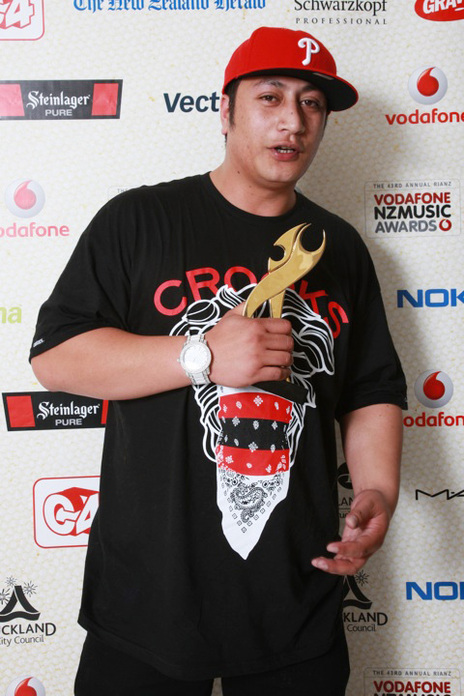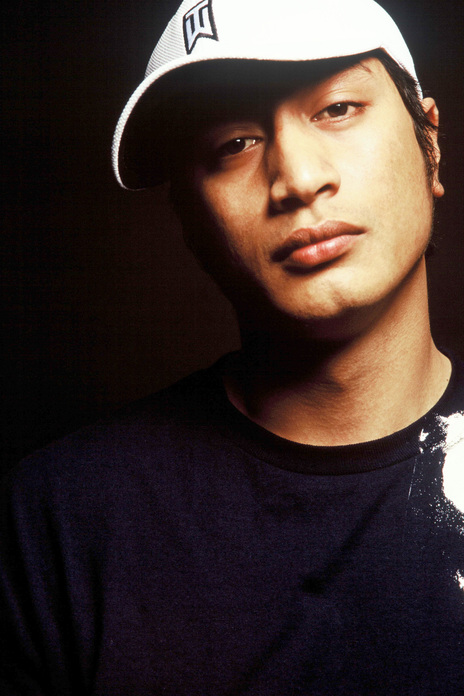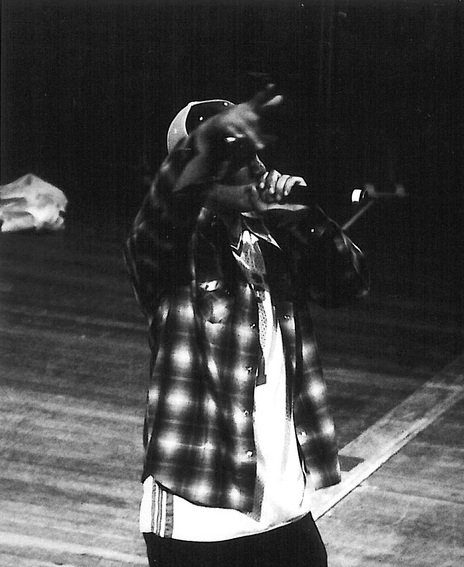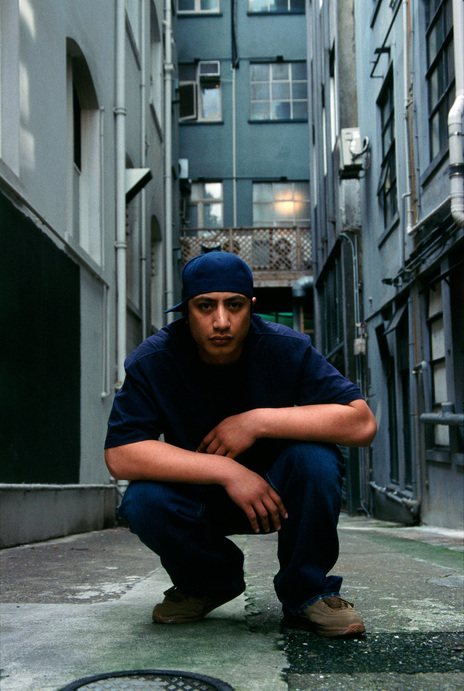Malo Luafutu (Scribe) was one of the first generation of local rappers who grew up with hip-hop as an ever-present backdrop to their lives. As a child, he heard the scratching on ‘Rockit’ by Herbie Hancock and saw breakdance being reported as a new fad on local television. In 1995, when Scribe was 15 years old, problems at school saw his parents send him to live with Reverend Mua Strickson-Pua in Auckland where he made his first serious attempts at rapping. He hooked up with a crew called Elements of Culture and recorded a demo at bFM with DLT. He passed his love of rapping on to the Reverend’s son Feleti, encouraging him to write a rap for a Sunday school competition – a formative experience for Strickson-Pua, who would later achieve fame as a member of Nesian Mystik.
Scribe put aside the gangsta rap he’d been listening to in Auckland and became interested in the more conscious-leaning hip-hop that Apirana put him onto.
Back in Christchurch, Scribe was befriended by musician Kuru Apirana, who often visited Scribe’s dad. At this point, Scribe put aside the gangsta rap he’d been listening to in Auckland and became interested in the more conscious-leaning hip-hop that Apirana put him onto, which included KRS-1, KMD, Smif & Wessun and Black Moon.
Apirana was also a turntablist (as DJ Kaboom) and took Scribe along to watch him rehearse with local group, Beats and Pieces. This crew was run by Antsman (Anton Carter), Hame (Hamish Clark, later a member of Breaks Co-Op) and DJ Richie Broke (Richard Mills, who Scribe knew as the boyfriend of his cousin, Sara Tamati). Scribe began performing with the group and formed a strong friendship with another newer member of the crew, DJ Ali (Alistair Toto).
Meanwhile, the hip-hop scene was also being given life by the Youth and Cultural Development centre (YCD), which supplied support for local hip-hop shows and classes. It was here that Scribe’s cousin, Karoline Tamati (Ladi-6) formed her first group, Sheelahroc, while her sister, Sara Tamati, made an early impact as a graffiti artist (writing as “Spex”). If that wasn’t enough, Antsman worked at the creative collective, Pacific Underground – originally started by Scribe’s cousin Oscar Kightley – and had their offices at YCD. Pacific Underground went on to release Landmark (1999), a CD of local acts. It was Scribe’s first opportunity to appear on a recording – supplying a verse to the track ‘’Credentials’ by Beats and Pieces. The group ended later that year, when Antsman moved to Wellington to take up a position as Pacific Islands Arts Adviser at Creative New Zealand.
Scribe then became an MC for DJ crew Main Sauce (who also took over the hip-hop show on RDU from Beats and Pieces). This outfit was run by DJ Ali, who had become a motivated show promoter and would go on to start the NZ Hip-Hop Summit in 2000. He often worked alongside DJ Sir-Vere (Phil Bell from Auckland) and DJ Shan (Shannon Dirks) as the S.A.S. crew to organise events that ranged across their three cities.
During one of these tours Scribe was introduced to upcoming local producer P-Money (Pete Wadams). At first, Scribe kept his distance, since he wasn’t really interested in turntables and P-Money had made his name in battle DJing. But when P-Money took a moment during the drive to Dunedin to play some of his own beats over the car stereo, Scribe was astounded. It wasn’t long before they were sending ideas back and forth between their two cities. This led to a hurried recording session at RDU and the resulting track, ‘Sunshine’, was named “best unreleased track” at the next b-Net awards (run by student radio stations throughout the country).
There was only one problem – P-Money was set on releasing these early tracks on his own album, Big Things (2002). Scribe decided it was better to wait and join with the new label, Dirty Records, which P-Money had set up. Nonetheless, Scribe was front-and-centre on P-Money’s first single ‘Scribe 2001’ and also appeared on the killer track that was its follow-up – ‘Synchronize Thoughts’ (where he appeared alongside 4 Corners). They weren’t hit singles, but the music videos went on high rotate, pushing the album to No.7 on the charts and putting Scribe into pole position for the explosion of local hip-hop that was just around the corner.
The energy was undeniable and the single ‘Stand Up’ hurtled to the No.1 slot.
Up until this point, the local charts were still dominated by rock music, despite the impressive inroads made by the likes of Che Fu, King Kapisi, and 3 The Hard Way. What was needed was a track that proved a clear gateway for rock fans into the world of hip-hop, so P-Money created a track with a upfront guitar riff (courtesy of Evan Short from Concord Dawn) and Scribe wrote lyrics to match – citing the names of various rock groups, alongside with local hip-hop figures. Talented video maker Chris Graham was brought in to create a video and he packed an old warehouse under Real Groovy Records with passionate hip-hop fans, then filmed Scribe rapping amongst them, like he was performing in the midst of a riot. The energy was undeniable and the single ‘Stand Up’ hurtled to the No.1 slot.
The ridiculous thing was that the single was backed by an equally strong track, ‘Not Many’ – the chorus was an instant catchphrase and the backing track had a perfect simplicity to it; a punchy beat overlaid with three ominous synth notes. In order make a new single out of the track, P-Money suggested bringing in two of the best local MCs to create a remix version – David Dallas (then known as “Con Psy”) brought his super-slick flow, while Savage (then a member of Deceptikonz) provided some street level aggression. Then Scribe got up for the last verse and killed it. The brilliance of the track saw it receive that year’s APRA Silver Scroll Award for songwriting. It hit No.2 on the charts and the album, The Crusader (2003), hit No.1 and stayed on the charts for seven months. A slower, more contemplative track, ‘Dreaming’ was released as a follow-up and Scribe received his second No.1.
There were no other obvious singles on The Crusader, though there were admirable contributions by Scribe’s long-term associates Ladi-6, Ali, Shan, and Tyra. By the middle of 2004, ‘Not Many (The Remix)’ had hit No.21 on the Australian charts and, soon after, The Crusader reached the No.12 slot. The album eventually went gold in Australia (35,000 units sold) and five times platinum in New Zealand (75,000 units sold). Scribe received an astounding seven awards at that year’s NZ music awards. [Update: in 2023 The Crusader was certified platinum in Australia – the streaming era equivalent of 70,000 albums sold]
Meanwhile, P-Money had recorded a follow-up album of his own and the lead single ‘Stop The Music’ once again put Scribe’s lyrics over a heavy guitar line. The result was the pair’s third No.1 in New Zealand and a No.7 slot in Australia. Local hip-hop was now everywhere – providing the soundtrack for massive ad campaigns, while local rappers toured the country like superstars and Scribe stood as the leading artist of this breakthrough movement.
Scribe was at a difficult juncture in his life – he was still only in his mid-twenties and his music career gave him the perfect opportunity to live the high life, but at the same time he had a pregnant wife with a young son at home.
The result was that his next album, Rhyme Book (2007), took four years to eventuate. P-Money’s only contribution to the album was helping to record some of the vocals and instead the production was done by newer beatmakers such as Fire & Ice, 10Alicious, and Nick ‘41’ McLaren (who was previously in Frontline with David Dallas). The album was a strong effort, but the hype around local hip-hop had faded in the intervening years and even with some strong early singles, it was always going to be struggle to match his former glories (especially in the age of digital downloading).
Scribe still had a strong body of fans and Rhyme Book managed a solid No.4 position on the album charts.
His first single, ‘My Shit’, was always going to have trouble being played on commercial radio but still hit No.4 in New Zealand. His biggest opportunity seemed to be with the power hitting beats of ‘F.R.E.S.H.’ but the single only just slipped into the Top 30 on both sides of the Tasman. Even the lively funk of ‘Say It Again’ wasn’t enough to see the track place on the charts, despite some strong singing from Tyra Hammond (ex-Sheelahroc, who would go on to front Opensouls). Yet Scribe still had a strong body of fans and Rhyme Book managed a solid No.4 position on the album charts.
At the same time, Scribe was beginning to face his own personal battles. He later admitted on TV3’s Campbell Live that his life was disrupted by heavy drinking, drug taking and gambling. Even before the release of Rhyme Book, he’d been criticised for not stepping in when his label mate PNC assaulted bFM DJ Phil Armstrong at a party held by his management company, CRS. His difficulties were later brought to the public’s attention when a pawnbroker who’d been holding his sales certifications as collateral decided to sell them on Trade Me.
Scribe had made the transition from musician to celebrity and now every foible provided bait for journalists and many of his tweets became news stories – as when he called Wellington police racist after being held overnight in the cells for allegedly punching a driver who did a hit and run on he and his cousin, Oscar Kightley, or when he raised questions about why cricketer Jesse Ryder had been assaulted in Christchurch.
Even during this problematic period there were some positive moments, including his involvement with the Aotearoa All Stars single ‘Think Twice’ that discouraged youngsters from committing crimes and he also took top billing at a benefit concert for Samoa after the 2009 tsunami.
His next appearances on recordings were on other people’s tracks – he guested on J Williams’ No.1 hit ‘You Got Me’ in 2010 and ended the year by appearing on a joke track by Dominic Harvey (radio DJ on the Edge), which popped on the charts for a week at No.6.
His own releases were low key – he reworked ‘Not Many’ as ‘Not Many Cities’ as a way of supporting his home city after the earthquake. His own brush with this disaster was a close one – he’d decided at the last minute about catching a bus with his cousin on the day of the earthquake and was horrified to later learn that this close relative had died during the event. He then joined with P-Money to create an unofficial track called ‘All Black Everything’ for the Rugby World Cup.
Scribe made an even stronger impact when he performed a striking version of Dave Dobbyn’s ‘It Dawned On Me’ at the APRA Silver Scroll awards in 2013 and he followed this by dropping a new demo, ‘Glowstick’. There was little chance of a return to the glory days of 2004, but it was a boon for local rap fans to finally have Scribe back in the game. New Zealand hip-hop would not be the same without him.
